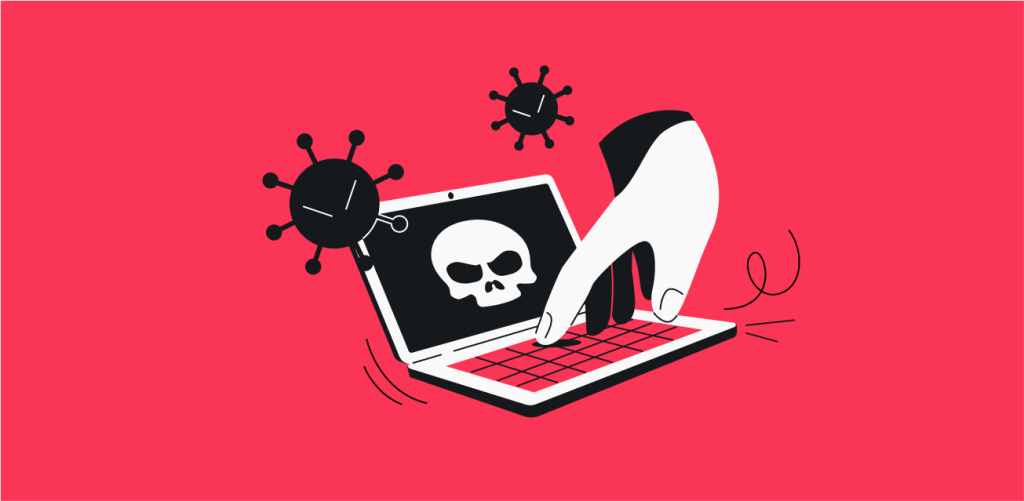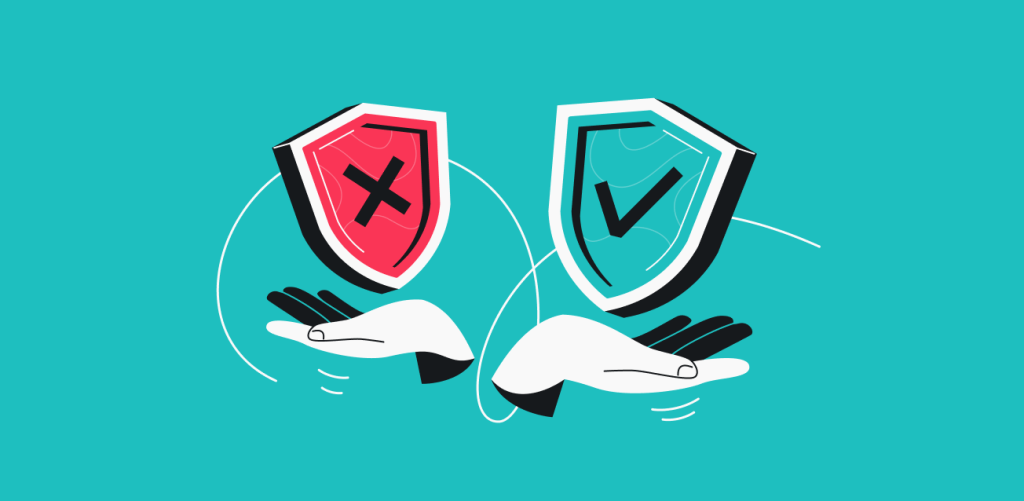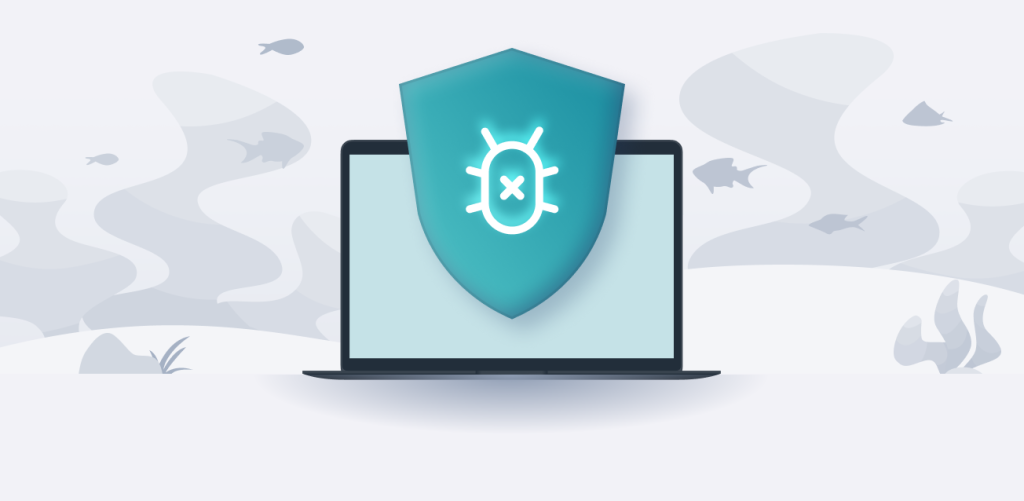
If you’ve ever used a computer, you must have heard of antivirus software. It is a program that finds, removes, and prevents viruses and other malware from harming your devices. But have you ever asked yourself how does antivirus software work? We’ll get into it today but first, let’s answer another important question.
Table of contents
What is a computer virus?
A computer virus is a type of malicious software that aims to harm your device. Computer viruses, much like human ones, replicate by spreading to other hosts through infected files.
Computer virus in action: Let’s say your coworker’s device is infected. You get an email from them, open the attachment, and boom! You’re infected as well. Then another coworker receives that same email from you, opens the attachment, and your entire work network is compromised before you know it.
While a computer virus might be one of the best-known malware types, it’s not the only one. Hackers come up with new ways to harm your devices every day. And luckily, antivirus software companies come up with new ways to protect you.
5 ways antivirus software detects viruses and malware
So let’s delve deeper into this magical tool that can identify and eliminate malware. As many different threats exist, antivirus programs need several methods to recognize them. Here are the main solutions:
-
Signature-based analysis
This relies on a good old virus signature database. Plenty of threats have already been found, and a regularly-updated database has been compiled. The signature-based analysis finds the signature of the possible threats on your devices, compares them to the known-malware database, and warns you about it if there’s a match.
-
Heuristic analysis
Now, what if there’s no match in the database? Does that mean you’re safe? Not always. That’s why many antivirus programs will also use heuristic analysis which implements a trial-and-error approach. That way, even the best-hidden malware can be found.
-
Sandbox detection
You’re right to imagine a literal sandbox in this scenario. A closed-off space where your antivirus software can run suspicious apps and see what they do without actually affecting your device.
-
Machine learning
Your antivirus software is a bunch of code. Naturally, it does not understand malicious software the same way humans do. This is why machine learning is so important. It allows the same code to rely on databases to identify potential threats.
-
Behavior monitoring
Antivirus programs aren’t just machines that work in their own space. They can also implement behavior monitoring. This behavior is the traffic between your and external devices. For example, printers, USBs, and external hard drives. Anything you can connect to your primary device needs to be monitored so it cannot do any harm.
You know how your antivirus software finds malware, but it’s the least you can expect from a good antivirus. Most services offer more than just the basics. So what other features can you expect, and how do they work?
4 ways antivirus software can protect your device
-
System scans
Regular system scans are an important part of any anti-malware software. Hackers are masters at hiding malware, so you cannot be expected to recognize it yourself. That’s why the best thing you can do for yourself is to invest in an antivirus program that will take malware detection off your hands.
-
Ransomware protection
Ransomware is pretty much what it sounds like. It is malware that will encrypt your files and make them unreachable to you, and the hackers behind it will demand a ransom in exchange for those files. Now, even if you do pay, it’s unlikely they’ll actually return the files. So an antivirus that can prevent that is a must.
-
Phishing protection
Anyone can fall for phishing. Think of how many times you’ve clicked on a link without knowing exactly where it leads. Sure, sometimes it’s quite obvious, but hackers are getting smarter as we are getting more cautious. That’s why many antiviruses can recognize phishing attempts and warn you before you’re exposed.
-
Wi-Fi inspection
Public Wi-Fi networks are convenient but also dangerous. You never know what’s lurking behind them. It is ridiculously easy for hackers to set up fake networks. All they have to do is name it after a nearby store, and most people will assume it’s safe. Luckily, reliable antivirus programs are now able to inspect the Wi-Fi you’re connected to for potential threats.
Do Macs need antivirus software?
Yes, extra protection is always a good idea. I know, I know, you’ve heard that Macs don’t get malware. Unfortunately, that’s not true. They’re less likely to get malware than, say, a Windows computer with no antivirus, but that doesn’t mean they’re safe.
It’s true that most of the apps you download on a Mac go through the app store and, therefore, should be secure. Still, there are some common apps you need to download from their original websites. A simple example would be Discord. You’ve probably heard of it, but did you know you cannot download it from the Mac App store?
Do you promise not to download apps you cannot find on the App store? Great! Now, what about Macs and phishing? Any chatting system that allows attachments can infect your device through a phishing attack.
So Macs… not as safe as you’ve been told. Is there anything better? Let’s take a look.
Do Chromebooks need antivirus software?
Maybe. Chromebooks are as safe as it gets! Except, well, is that really true? Chromebooks are less vulnerable to malware attacks, but is that just because of their OS (Operating System)? I’d love for it to be so, but the perfect OS doesn’t exist yet. The reason hackers target them less is actually quite simple – fewer people use them. Why focus on the small fry when there are bigger fish like Windows?
That might be good to hear if you’re a Chromebook user. Still, that doesn’t mean you’re protected. Let’s say there are two houses side by side. A giant, golden mansion and a simple two-story house. Obviously, any robber will pick the mansion. But the mansion owners have installed steel doors, barred up the windows, and bought the most expensive security system. And the two-story house is just standing there. Why not take a look? Sure, the bounty might not be as big, but the robbers will still get something.
Yes, the two-story house was your Chromebook in this metaphor. So why not get anti-malware software? Better safe than sorry, right?
Do Android devices need antivirus software?
Yes. Sure, it’s called a computer virus but that doesn’t mean you shouldn’t be worried. Android devices are just as likely to get infected as other operating systems. Sure, you can argue that you should be fine if you only download apps from the Google Play Store. But there are still many fake apps on there that could put your device at risk.
And apps aren’t the only threat. Personally, I mostly check emails on my phone. So if I fall for a phishing attack (oh god, our security officer would kill me), my phone will be infected. Before you relax, think about how often your devices are exposed to threats.
Free vs. paid antivirus software
So, what type of antivirus should you get? Is free antivirus software enough when compared to a paid antivirus? We have a great article comparing free vs. paid antivirus software but let’s take a quick look here.
Free antivirus software companies have fewer resources to maintain their product. Therefore, they not only offer fewer features but are less likely to react efficiently to new threats. The features you will get will differ from product to product, but here is a basic comparison table:
Free antivirus | Paid antivirus | |
|---|---|---|
Behavior-based scanning | ||
Customer support | ||
Extra features | ||
Shows ads | ||
Regular security updates | ||
Covers more than one device |
How to choose the best antivirus software
There are several factors you need to consider when choosing antivirus software.
- Scanning. The least your antivirus software can do is offer manual scans. This ensures that malware is detected before it can do any serious harm.
- Detection rates. It’s important to check detection rates when choosing an antivirus. If it only detects 20% of what other antivirus software on the market does, it’s not for you.
- Behavior-based detection. Your antivirus software should look beyond the device you are using and ensure you’re protected from the threats brought on by external devices as well.
- Extra features. Antivirus software is no longer just about malware. Look for the app that will offer you as many safety features as possible.
- Speed. Any bulky apps, especially antivirus software, will slow down your device. Find one that offers the smallest speed drop.
- Price. Antivirus software prices can vary from nothing at all to $200 a year. Consider how much you’re willing to spend, and don’t overpay.
Closing thoughts: do you need antivirus software?
Whether or not you understand the inner workings of antivirus software, the simple fact is this: you need it because even the most secure devices can get infected. If you don’t know where to start, check out Surfshark Antivirus.
Think of how much information your devices hold. Your photos, work files, passwords, messages, and even your bank information. What if you lost all that because of a wrong click? In our ever-growing cyberworld, malware is a storm. And you should invest in one sturdy umbrella to stay protected.
FAQ
Does antivirus software actually work?
Yes, antivirus software works. It has been around for years for a reason. Malware is a real threat, and these services are here to protect you.
Does antivirus software remove viruses?
Yes. Most antivirus software will remove any viruses it finds on your system. Or, at the very least, prompt you to remove it.
Can I install an antivirus if I have a virus?
Yes. If the best time to start was yesterday, the second best time is today. So if you didn’t have an antivirus before you were infected, the least you can do is get one after.
How do I tell if my computer has a virus?
- Your computer slowed down for no apparent reason;
- You’re missing files or finding new ones you didn’t download;
- Your system crashes or shows errors more often;
- You get unexpected pop-up messages or ads;
- You find sent emails you didn’t write;
- Your antivirus software starts malfunctioning.



